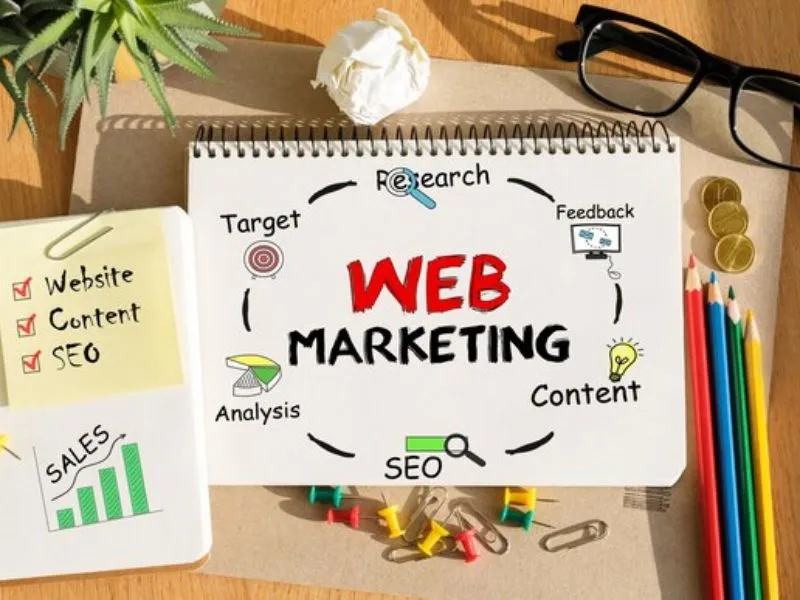What is the website marketing? Discover the power of website marketing! Learn essential strategies like SEO, content marketing, social media, and PPC to drive traffic, boost engagement, and grow your business online.
What is the website marketing?
Introduction to Website Marketing
In the modern digital era, simply having a website is insufficient. You need to actively promote and market your website to reach your target audience and achieve your business goals. Website marketing is a broad term that includes various strategies and techniques aimed at driving traffic, engaging visitors, and converting them into customers.
This guide will explore the concept of website marketing, its importance, and the most effective strategies you can use to boost your online presence.
What is Website Marketing?
Website marketing refers to the process of promoting a website to attract visitors, improve brand awareness, and generate leads or sales. It involves multiple digital marketing strategies such as SEO (Search Engine Optimization), content marketing, social media marketing, email marketing, and paid advertising.
What is the website marketing?
Importance of Website Marketing
- Increases Visibility – A well-marketed website reaches more people and attracts potential customers.
- Drives Traffic – Proper marketing strategies bring a steady stream of visitors to your site.
- Boosts Brand Awareness – A strong online presence helps people recognize and trust your brand.
- Enhances Customer Engagement – Well-optimized content and marketing efforts encourage interactions.
- Generates Leads and Sales – The ultimate goal is to convert website visitors into paying customers.
What is the website marketing?
Key Strategies for Effective Website Marketing
1. Search Engine Optimization (SEO)
SEO involves enhancing your website to achieve a higher ranking on search engine results pages (SERPs). It involves:
- Keyword Research – Identifying the best keywords related to your business.
- On-Page SEO – Optimizing content, meta tags, headings, and images.
- Off-Page SEO – Building backlinks and promoting content.
- Technical SEO – Improving site speed, mobile-friendliness, and structured data.
- Local SEO – Optimizing for location-based searches.
- Voice Search Optimization – Adapting content for voice-based queries.
What is the website marketing?
2. Content Marketing
Content marketing focuses on creating valuable and relevant content to attract and engage users. It includes:
- Blog Posts – Informative articles that answer user queries.
- Videos – Engaging video content to enhance user experience.
- Infographics – Visual content to present data effectively.
- Ebooks & Whitepapers – In-depth resources for lead generation.
- Case Studies – Success stories that build credibility.
- Podcasts – Audio content to engage a different audience.
3. Social Media Marketing
Social media platforms help businesses connect with their audience, promote content, and build brand loyalty. Key social media marketing strategies include:
- Creating Shareable Content – Engaging posts that encourage sharing.
- Using Paid Ads – Targeted ads to reach potential customers.
- Interacting with Followers – Responding to comments and messages.
- Influencer Marketing – Collaborating with influencers to expand reach.
- Social Media Contests & Giveaways – Encouraging participation and engagement.
- Live Streaming – Real-time engagement with your audience.
What is the website marketing?
4. Email Marketing
Email marketing continues to be one of the most powerful strategies in digital marketing. It involves:
- Newsletter Campaigns – Regular updates and promotions.
- Personalized Emails – Custom messages based on user behavior.
- Automated Sequences – Drip campaigns for nurturing leads.
- A/B Testing – Testing subject lines, content, and CTAs.
- Segmentation – Targeting specific groups for better engagement.
- Re-engagement Campaigns – Bringing inactive subscribers back.
What is the website marketing?
5. Pay-Per-Click (PPC) Advertising
PPC is a paid marketing strategy that drives immediate traffic to a website. Popular PPC platforms include:
- Google Ads – Running search and display ads.
- Facebook Ads – Targeted advertising on Facebook and Instagram.
- LinkedIn Ads – B2B advertising for professionals.
- YouTube Ads – Video advertising to engage users.
- Retargeting Ads – Bringing back visitors who left your site.
What is the website marketing?
6. Affiliate Marketing
Affiliate marketing involves partnering with influencers and bloggers who promote your products in exchange for a commission. Benefits include:
- Increased Reach – Leveraging other people’s audiences.
- Cost-Effective – Paying only for successful sales.
- Trust and Credibility – Influencer recommendations boost trust.
- Diverse Marketing Channels – Utilizing blogs, videos, and social media.
What is the website marketing?
7. Conversion Rate Optimization (CRO)
CRO is centered on enhancing your website to boost conversion rates. Key techniques include:
- A/B Testing – Comparing different versions of pages.
- Clear CTAs (Call-to-Actions) – Encouraging visitors to take action.
- User Experience (UX) Optimization – Improving site navigation.
- Mobile Optimization – Ensuring mobile-friendliness.
- Landing Page Optimization – Enhancing lead capture forms.
- Trust Signals – Displaying testimonials and security badges.
What is the website marketing?
8. Online Reputation Management (ORM)
ORM involves managing and improving how your business is perceived online. Key strategies include:
- Encouraging Positive Reviews – Asking satisfied customers to leave reviews.
- Responding to Negative Feedback – Addressing concerns professionally.
- Monitoring Brand Mentions – Using tools to track online mentions.
- Creating Positive Content – Publishing case studies and testimonials.
- Press Releases – Sharing company news and updates.
What is the website marketing?
9. Video Marketing
Video content is highly engaging and effective for website marketing. Strategies include:
- YouTube Marketing – Creating and optimizing videos for YouTube.
- Live Streaming – Hosting live Q&A sessions and webinars.
- Short-Form Videos – Using platforms like TikTok and Instagram Reels.
- Video SEO – Optimizing video titles, descriptions, and tags.
- Product Demonstrations – Showcasing products in action.
- Behind-the-Scenes Content – Humanizing your brand.
What is the website marketing?
10. Analytics and Performance Tracking
Monitoring your website’s performance helps you refine your marketing strategy. Important tools include:
- Google Analytics – Tracking visitor behavior.
- Google Search Console – Monitoring search performance.
- Heatmaps – Understanding user interactions.
- A/B Testing Tools – Testing different versions of web pages.
- Customer Feedback Surveys – Gathering insights directly from users.
- Competitor Analysis – Benchmarking against industry rivals.
What is the website marketing?
Conclusion
Website marketing is a powerful way to grow your online presence, attract more visitors, and increase revenue. By using a combination of SEO, content marketing, social media, email marketing, and paid advertising, you can create a successful marketing strategy that drives long-term results.
By continuously monitoring and optimizing your efforts, your website can become a valuable asset for your business, helping you stay ahead in the competitive digital landscape. Whether you’re a small business owner or a large corporation, implementing the right website marketing strategies will ensure sustained growth and success.







